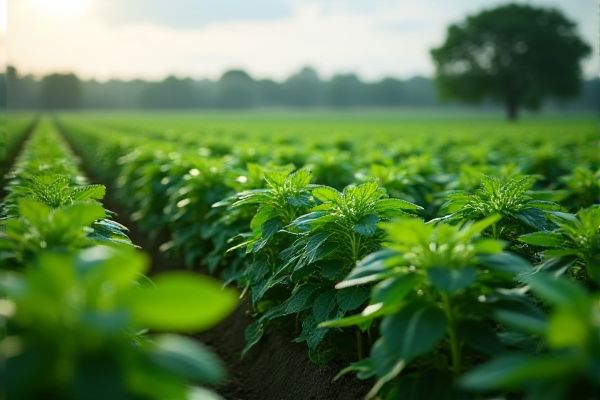
AI technologies enhance precision farming by analyzing massive datasets from soil sensors, weather forecasts, and satellite imagery, enabling farmers to make informed decisions. Predictive analytics help in identifying crop diseases early, optimizing pest control measures, and improving yield forecasts. Automation through AI-powered machinery, such as drones and robotic harvesters, increases efficiency and reduces labor costs. By implementing AI, farmers can achieve sustainable practices, minimize resource waste, and maximize productivity in their agricultural operations.
AI usage in smart agriculture
Precision Farming
AI in smart agriculture can enhance crop yield and reduce resource waste by analyzing data from sensors and satellite imagery. Precision farming practices, such as variable rate application, allow farmers to optimize fertilizer and pesticide usage based on field variability. This targeted approach can lead to more sustainable farming, potentially increasing profitability for institutions like agricultural co-ops. The use of AI-driven predictive analytics may also help in anticipating weather patterns, further aiding farmers in decision-making processes.
Crop Health Monitoring
AI usage in smart agriculture can enhance crop health monitoring by providing real-time data analysis through satellite imagery and sensor technology. This approach potentially allows farmers to detect early signs of disease or nutrient deficiencies, improving crop yields and reducing losses. For example, institutions like the University of California are researching machine learning algorithms that analyze soil health and optimize irrigation methods. The possibility of automating these monitoring processes presents a chance for more efficient resource management on farms.
Automated Irrigation Systems
AI can optimize water usage through automated irrigation systems, enabling precise control over watering schedules based on real-time soil moisture data. This technology minimizes water waste, conserving resources while enhancing crop yields. Farms using these systems may experience increased efficiency, potentially reducing operational costs. Institutions like the University of California's research programs highlight the benefits of AI in promoting sustainable farming practices.
Yield Prediction
AI can enhance yield prediction in smart agriculture by analyzing vast datasets from various sources, such as weather patterns and soil conditions. Machine learning algorithms can identify trends and patterns that inform farmers about optimal planting times and resource allocation. For example, institutions like the International Rice Research Institute are utilizing AI to improve rice yields through data-driven insights. This technology presents a significant chance for farmers to optimize production and minimize waste.
Soil Quality Analysis
AI can significantly enhance soil quality analysis by providing precise data on nutrient levels and moisture content. For example, institutions like the University of California are utilizing AI algorithms to predict soil health, which may lead to better crop yields. This technology offers the possibility of real-time monitoring and adjustments, allowing farmers to optimize their practices efficiently. Improved insights into soil conditions can ultimately result in reduced costs and increased productivity in smart agriculture.
Pest and Disease Detection
AI can enhance pest and disease detection in smart agriculture by analyzing data from sensors and images. For example, machine learning algorithms can identify early signs of crop diseases, which allows farmers to take preventive measures. This timely intervention can lead to increased yields and reduced pesticide use. Incorporating AI tools can offer farmers a significant advantage in managing their crops more effectively.
Autonomous Machinery
AI usage in smart agriculture can enhance crop management and optimize resource allocation, resulting in increased yields. Autonomous machinery, such as drones and self-driving tractors, can monitor field conditions and perform tasks with precision. The integration of these technologies may reduce labor costs and minimize environmental impact. Institutions like the Food and Agriculture Organization (FAO) promote these innovations to improve food security globally.
Weather Prediction Models
AI usage in smart agriculture enhances crop yields through data-driven insights and automation. Weather prediction models utilize machine learning to improve accuracy in forecasting climatic conditions, which helps farmers make informed decisions. For instance, a well-timed irrigation schedule supported by precise weather data can lead to better water conservation. The integration of AI technologies may open new avenues for sustainable practices and increased efficiency in agricultural productivity.
Resource Management
AI in smart agriculture enhances resource management through precision farming techniques. By optimizing water usage and soil health, farmers can increase crop yields while minimizing waste. For example, using AI-driven sensors can lead to better irrigation practices. The potential for increased efficiency and sustainability in agricultural operations is significant.
Supply Chain Optimization
AI can enhance smart agriculture by providing precise data analysis, enabling farmers to make informed decisions about crop management. For example, Machine Learning algorithms can predict yield outcomes based on environmental factors, potentially increasing efficiency and profitability. In supply chain optimization, AI can forecast demand, streamline inventory management, and reduce waste, improving overall operational efficiency. The integration of AI in these areas presents opportunities for significant advancements in productivity and sustainability.
 techknowy.com
techknowy.com